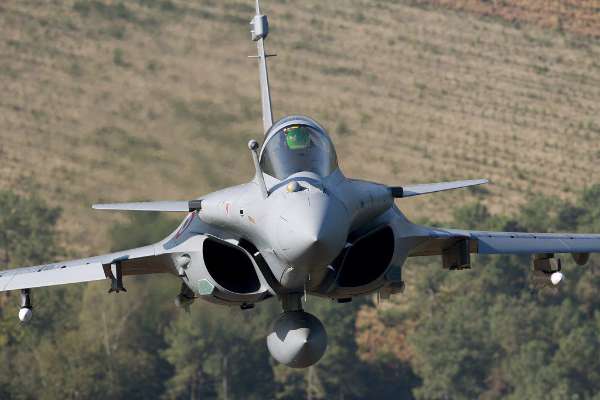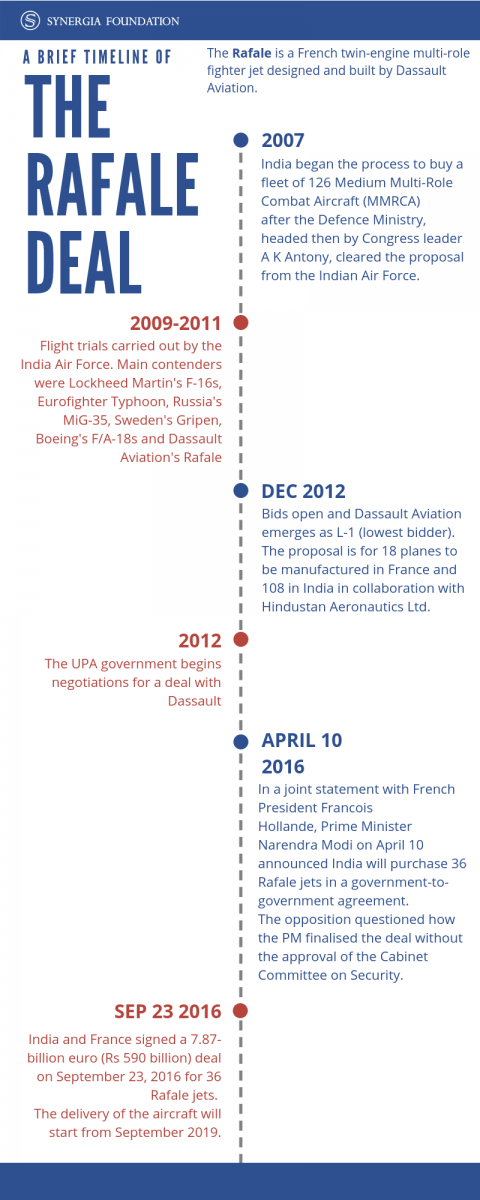Rafale Verdict
December 15, 2018 | Expert Insights

In an apparent victory for the Modi government, India’s Supreme Court said there was "no occasion to doubt" the procurement process for the purchase of 36 Rafale fighter jets from Dassault Aviation.
Background
In 2007, the Indian Air Force advanced a proposal to buy 126 fighter aircraft. The IAF has a strength of 34 squadrons in total but hoped to acquire a total of 42 combat squadrons by 2032 in order to meet the contingencies of a two-front war.
In April 2015, the Indian government announced the deal to buy 36 Rafale fighter jets from France, about three years after the previous government decided to purchase 126 Rafale fighter jets, 108 of which were to be made in India by HAL. The Rafale fighter is a twin-engine Medium Multi-Role Combat Aircraft manufactured by French aerospace company Dassault Aviation.
The deal has stirred controversy across the country; the opposition and past petitioners to the Supreme Court have claimed that the government bought the jets at an inflated price and benefitted Reliance Defence at the expense of state-owned Hindustan Aeronautics Limited (HAL).
On November 14, the Court had reserved orders on the petitions alleging corruption and procedural irregularities in the deal for procurement of 36 jets from the French company. When delivering its final verdict on the Rafale deal, the court highlighted three issues it would examine in the hearing: the first was a process, whether the government followed the specified procedure in the purchase of 36 Rafale fighters in flyaway condition. The second is the controversy over pricing, and the third was the choice of Anil Ambani’s company as one of the key offset partners of Dassault aviation.

Analysis
The Supreme Court on 14 December dismissed a group of petitions that demanded an investigation into the controversial Rafale fighter jet deal, saying that it was satisfied that the process for procurement had been complied with. The court has refused to go into any further enquiry into the purchase of the Rafale fighters. The SC said that when it comes to questions of contracts, in particular, commercial contracts that have a national security implication, the court’s jurisdiction is perforce limited.
The judgement was delivered by a three-judge bench comprising Chief Justice Ranjan Gogoi, Justice Sanjay Kishan Kaul and Justice KM Joseph. According to oral remarks made by the bench, the apex court stated that it could not sit in judgement over the decision purchase 36 aircraft instead of 126. It is a “hard fact” that the 36-jet-deal was negotiated after the earlier RFP for 126 jets came to nothing, the court said. “So far as the decision-making is concerned, we have studied the material and interacted with senior air force officer,” Chief Justice Gogoi said, adding, “there was no occasion to doubt the process”.
We are satisfied that there is no occasion to really doubt the process, and even if minor deviations have occurred, that would not result in either setting aside the contractor requiring a detailed scrutiny by the Court,” he added.
The court has traced some aspects of the process that the government has followed in settling the purchase of 36 Rafale fighters, and concludes without going into great detail that even if minor deviations have occurred, that would not result in either setting aside the contractor requiring a detailed scrutiny by the court, and says that broadly the processes have been followed.
On the issue of pricing, the court said that while it made inquiries in the interests of transparency, the government has maintained that pricing is a highly sensitive issue and that it has been very careful not to share these details lest information on the nature of weaponry carried by the fighters make their way into the hands of enemy countries. The court reiterated the governments claim that there was a commercial advantage to the price paid, without endorsing its view.
On the issue of offsets, the court has traced the origin of the controversy surrounding the choice of offset partner to the interview given by former French President Francois Hollande, in which Hollande said that the choice of Anil Ambani’s company was imposed on Dassault; the court ruled that under the defence procurement procedure of 2013, the choice of offset partner lay with the original equipment manager and that the Indian government had no say in the decision.
Counterpoint
The supreme court frequently reiterated the caveat that their jurisdiction in this particular procurement deal was limited, which seems to be contradicted by their verdict that ostensibly exonerates the government on all three counts.
Advocate-activist Prashant Bhushan said that the Supreme Court’s verdict was in his opinion “totally wrong”. “This is a limited clean chit. The court hasn’t dealt with many of the issues that we raised,” Bhushan said.
Assessment
Our assessment is that the court’s exoneration of the government seems to be limited and that many issues raised by petitioners have not been addressed in the verdict. We believe that while secrecy in the interest of national security can be justified, certain issues, such a lack of a sovereign guarantee, and statements made by former President Hollande about the procurement process, merit closer scrutiny.








Comments